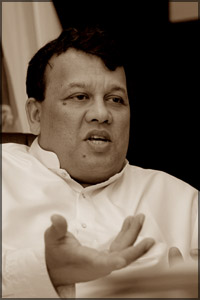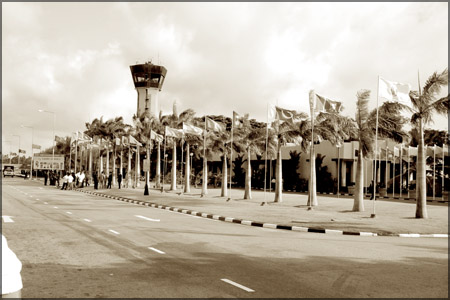Disaster
Management and Human Rights a sine qua non for prosperity and stability
- Mahinda Samarasinghe
Interviewed by Indeewara THILAKARATHNE
[email protected]
 In an interview with Sunday Observer, Minister of Disaster Management
and Human Rights Mahinda Samarasinghe expresses his views on the
significance of SAARC and the stability in the region in order that it
be seen as a secure and stable region in the eyes of the rest of the
world and that the Governmentís policy on Human Rights is transparent,
accountable and towards a safer Sri Lanka for all citizens. In an interview with Sunday Observer, Minister of Disaster Management
and Human Rights Mahinda Samarasinghe expresses his views on the
significance of SAARC and the stability in the region in order that it
be seen as a secure and stable region in the eyes of the rest of the
world and that the Governmentís policy on Human Rights is transparent,
accountable and towards a safer Sri Lanka for all citizens.
As Sri Lanka takes up the chair of regional grouping SAARC, how do
you assess the significance of SAARC?
SAARC has now been existence for 23 years. The significance of SAARC
is that it brings together heads of states of all eight countries and
also the Foreign Ministers and officials in a structured forum to work
cooperate and agree on key thematic areas which are relevant and useful
to bring about stability and prosperity to the people of SAARC
countries.
Final objective, of course, is to endorse agreements which are
reached as a result of various levels of discussions taking place by the
head of states when they meet in a plenary session at the SAARC summit.
So there is a whole series of activities which take place throughout
the year culminating with SAARC head of Governments summit meeting at
which point endorsements are given and then decisions are put into
effect and then reviewed at subsequent meetings, until the next summit
meeting of Heads of State.
So it is a very structured format and not an ad hoc format. It has
been happening for twenty three years and there has been a lot of work
done over these twenty three years.

Regrettably not everything has been implemented but I was reading a
couple of days ago a statement by made by the Prime Minister of
Singapore Gen. Lee Hsien Loong when he addressed the ASEAN sessions held
recently in Singapore where he says after forty one years of summitry,
ASEAN has been successful with only thirty percent of the agreements
reached. This is not unique to ASEAN.
People expect regional groupings especially when they meet at the
heads of governmental level and when decisions are taken, that these
decisions are implemented fully. But it does not happen exactly like
that anywhere.
There are always shortcomings. By and large I would say that this
whole experience of a SAARC regional grouping has been a positive
experience for the people of SAARC countries rather than a negative
experience.
For the future, I would say it would be made even more positive with
greater understanding of the importance of working together as a region
whilst we ensure that our individual likes and dislikes as sovereign
nations including our priorities and policies are not compromised in any
way.
On the one hand, we as sovereign nations have our own respective
governments and have our own priorities; whether it be political,
economic, cultural or in social spheres.
In a democracy after a certain period, elections are held and new
governments are endorsed by the people and those governments could have
different policies that they then put forward.
But at the same time whilst not compromising on those lines, we are
also trying, by working in this kind of regional grouping, to identify
common ground, arrive at common programmes of action and execute them in
a way that it will demonstrate that we as a region are working together
and standing together and thus seen to be able to face up to a
competitive globalised environment that we have to work with.
The rationale and sustainability of all regional groupings has been
primarily this.
How is it important from the perspective of protecting human rights,
especially in a conflict situation?
Well, human rights, of course, are paramount. If we speak of this
yearís theme which is People in partnership. We have to inevitably talk
about their (peopleís) legal rights, constitutional rights and, go even
beyond all that by talking about the promotion and protection of human
rights.
So strengthening democracy, ensuring good governance and
transparency, accountability towards the people by any administration of
any country, respecting the fundamental rights which are enshrined in
the Constitutions of the SAARC block countries are of paramount
importance.
Thatís what the people expect any government to do; respect of the
rule of law, regular free and fair elections are all part and parcel of
promotion and protection of human rights.
However, in the context of a conflict, it becomes a bit more complex.
On the one hand, we have a duty to safeguard the territorial integrity
and sovereignty of the country.
This is also a duty entrusted by the constitution to the armed forces
and the police. When you measure up to that task, inevitably there are
accusations that are levelled that you are not respecting the laws of
the county, international human rights standards that countries have
accepted.
Whilst the armed forces and the police of a nation have the ultimate
duty of eliminating those forces of terror and ensuring territorial
integrity and sovereignty of the people and the country, it is important
to be conscious that whilst facing up to such challenges they behave in
a professional manner, respecting the laws of the country and
international obligations that as sovereign nations they have acceded
to.
If the laws are not sufficient to meet the challenges, then in a
democracy one would resort to amending the laws to have a sound legal
basis to continue. This is the challenge.
Our armed forces and the police, I would say, are very conscious of
these standards. They have come a long way from a ceremonial army in the
70ís to being a very professional army.
If you look at what they have been doing in the Eastern province in
the course of liberating the East from the clutches of terror, there
were very few civilian casualties, if at all, because of the extreme
caution and professionalism displayed by our armed forces.
There is even written instructions given by the commanders of the
armed forces and the IGP to the rank and file that in their activity of
engaging terrorists that they must ensure minimum civilian casualties.
There is even a human rights cell established in each of the forces
and police who report directly to the commanders and disseminate
International Humanitarian Law (IHL) to the rank and file on a sustained
basis. I would say viewed in that context, our armed forces and the
police have been doing a remarkable job of which we should be proud of.
No country can guarantee zero percent civilian casualties when facing
the kind of terror that many of our countries have been facing. I would
also add, that if there are excesses then the people responsible will be
held accountable. This is what professionalism is all about.
Compared with other countries of the region, what is your view on the
degree to which Sri Lanka has been protecting its citizensí Human
Rights? First of all, Sri Lanka is not a two bit despotic republic. It
is a vibrant democracy. We have had free and fair regular elections in
the country. We have allowed international observers to come in and
observe the conduct of elections.
This has been a practice which has been ongoing for some time. We
have a vibrant independent judiciary in the country and we have seen
that the judiciary delivers very independent judgments.
There have been regular prosecutions against members of the armed
forces, police and other state officials launched by the Attorney
Generalís Department. We have been having an open economic system or
free enterprise system since 1978. We were the first in South Asia to
liberalise the economy. We have a number of international media
organisations who are working in Sri Lanka and commenting on Sri Lanka.
We have been open enough to invite high level UN special representatives
to Sri Lanka and allowed them to go anywhere in Sri Lankan, including
the conflict areas in order to find out what is happening so that they
can present their reports to international mechanisms like Human Rights
Council. We have been a very open and transparent country for a very
very long time. I would say that we are definitely right up there and
second to none in terms of commitment to promoting and protecting human
rights in a very complex environment. But like others we have still
issues that need urgent attention to better the situation.
In terms of going through conflict situations, numbers of other
countries in the SAARC region have been facing similar situations.
Afghanistan has been facing a serious situation for some time so has
India and Pakistan who have had to face terror from time to time. There
was a spate of bombings last week in Bangalore and Ahmadabad. In Sri
Lanka we have been experiencing terrorism for over three decades. In
Maldives, the Maldivian Government of President Abdul Gayoom faced an
invasion of sorts some times ago which was fortunately suppressed. India
and Sri Lanka both assisted Maldives on that occasion. President Gayoom
is in the process of putting final touches to a new Constitution in
Maldives.
In Nepal, we saw the 250 year old monarchy disbanded and the election
of Maoist rebels to parliament. Every Country in the region has had
issues. So it is not a unique problem to Sri Lanka and it is, really, in
all our interest to work together to eradicate this problem of terror to
ensure that our countries are stable politically, economically and
socially so that our region would be viewed by the rest of the world as
a stable region which is important in promoting investments and economic
opportunities.
Decisions are now, increasingly being taken by very large investors
by not looking at individual countries but by looking at the region as a
whole. For instance, there are very large pension funds in North America
and in Europe which take decisions to invest for example in stock
exchanges in countries out side their respective countries by working
out the stability in the regions.
Our region must be a stable region and attract these investments in
the first instance and then compete from a country point of view to get
whatever we can. Therefore, the deliberation on common issues such as
terrorism, food security, poverty alleviation, regional harmony, and
promotion and protection of human rights are vital in the SAARC context
and regional cooperation essential to give effect to plans of action in
order to face such challenges which would be beneficial to all of our
countries resulting in greater social, economic, political stability not
only as individual countries but also as a region. |
